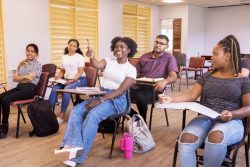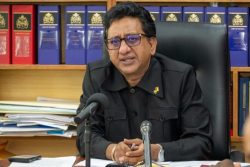Story and photos by Jannelle Williams
If you blink when travelling by car along the Corentyne Highway, you will most likely miss Lewis Manor. To say the village is tiny would be overstating its size. Developed in the 1800s after slavery was abolished, Lewis Manor (which is also referred to as Number 9 Village) has some 13 houses on the southern side and only one house on the northern side. The only other building is the Police Outpost which is at the end of the village. The village is between Number 7 and Number 11 villages.
The village’s oldest resident, 88-year-old Sheechoria Sookhoo is a direct descendant of one of Lewis Manor’s founding families. Sookhoo has lived his entire life in the village and according to him, there has always been a “stagnation in house building here as everybody only migrating.” The octogenarian revealed that he had fathered 11 children “and if all of them were here it would have been 11 houses, but none of them are here.”
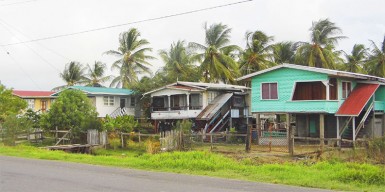
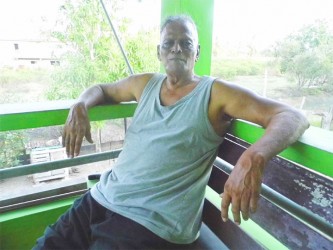
All of his children reside in North America, so he is currently sharing the family home with some of his grandchildren and their offspring. Sookhoo stated that a lack of job opportunities coupled with a deep need for personal development propelled his children to seek lives outside their village and country. “In those days, it was either you go university or national service. So people send away their children.”
Sookhoo believes the moment ties with Great Britain were severed, the downfall of the country began. “Since we break away from the Queen punishment start; the bauxite industry broke down, now the cane industry breaking down. We nah get white people and when you had white people they de giving we education and food, so we were having a good life.”
Fishing, salt pass, and playing cricket were some of the main pastimes in the village decades ago. Reflecting on his days as a lad playing Salt Pass, Sookhoo said “me and the boys use to draw a line and we jumping and catching one another. It was a good exercise, when you jumping and catching your friends.” He noted that today, the kids are more into electronic gadgets as forms of entertainment. “They don’t play those games anymore. Now they sit down on computer and them with the phone whole day. There is nothing here to do.”
There is no community centre, health centre, shop or school. Villagers access these from neighbouring communities. Children go to school either in Bohemia or Number 2 Village. What is to be found in the village, however, are empty house lots and vacant lands begging to be occupied and utilized.
After slavery was abolished the lands were made available for sale to those who had money to purchase. Over the years, the lands have passed from hand to hand, but it is said that the Rose family, which still owns a large portion of the village, were the original property owners.
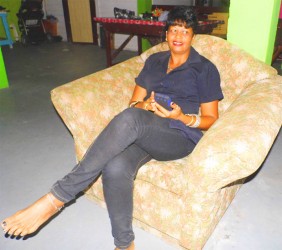
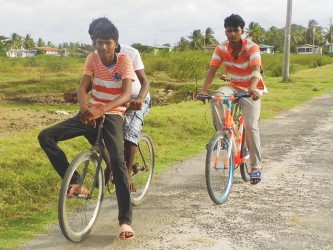
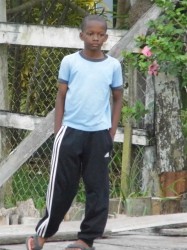
“This is a beautiful village – the atmosphere here is so pleasant. You don’t want to go nowhere. But circumstances force people to migrate. You don’t have a healthy place like this anywhere else in the country,” boasted Sookhoo even as he bemoaned the fact that persons have abandoned their lands and left the village underdeveloped. “You see the land next door to mine, it vacant, the owner has no interest in it so it has been left undeveloped.”
He expressed displeasure with the fact that “people get land and not do anything with it’ and suggested “this is things the government should intervene. We got a lot of land wasting and people want land. Do something with it. Yes you getting bread and butter overseas but that don’t mean you got to neglect the place, you got to keep it clean.”
The households in the village range from Indo-Guyanese nuclear families of 3 to extended families of 11, and represent the third and fourth generations of the founding families.
When Sunday Stabroek visited, 39-year-old Patricia Schneider was allowing her daughter to put highlights in her hair. She described the village as “always quiet, friendly with everybody helping each other.” Schneider is one of the villagers who left. At the age of 19, she left the village and didn’t look back, got married and settled in Soesdyke on the Linden Highway. After 15 years and a failed marriage, she returned to the only place she ever thought of as home – Lewis Manor. She was surprised to see the village had morphed into having “more bushes than people.”
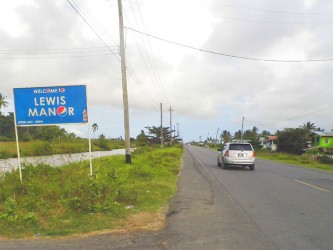
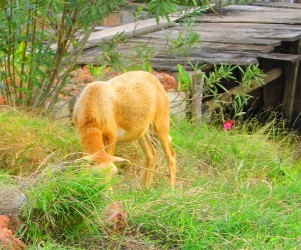
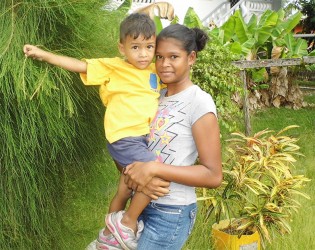
According to her, the village was more populated in her youth, “there had more people here; a lot more people. It had more houses in the street. I can’t really say what happen to the houses, but one collapsed and another was sold to a relative who move it to another village.” Nevertheless, she was pleased that the village began receiving potable water from GWI and electricity in her absence.
A mother of four, Rosaline Shivrattan was enjoying some country-western music when Sunday Stabroek stopped by. She also described the village as being quiet, noting that “this is how it is from years gone back. It’s a family village. Most of the generations are like one or two families, you don’t really have outsiders in this village.” The residents, she said, can all trace their roots back to the Sookhoo and Brijal families.
Shivrattan had migrated out of the village to raise her family, but returned a couple years after to take care of her uncle’s house, while he resides overseas.
Despite the vast vacant lands in Lewis Manor, the village does not have a ball field. Youths and residents use the ball field in the neighbouring village of Number 7. This however did not deter them from forming a cricket team. “We are trying to get the kids active. We want to get them occupied. We don’t want them to get involved with alcohol or drugs. Even the fellas when they come home from work, you know they don’t have to go to the rum shop, all body going at the back there to play cricket,” Shivrattan said.
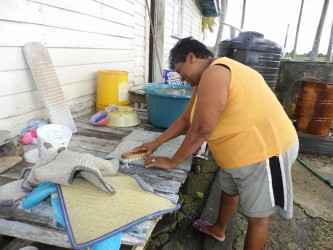
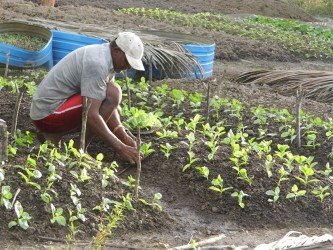
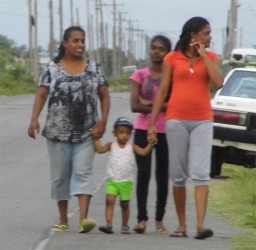
While crime is not a major issue, the village is still plagued with petty theft. “Now and again we will get fowl pen thief, but not from the village, is people who come from outside the village. Outsiders come in and do it. Even quarrelling you don’t get it too much – otherwise no crime.”
Though grateful for electricity and water, the villagers say what is now needed in Lewis Manor is street lights. “We need lights on the road, because when it’s nighttime it does be real dark. And this is the road you know that most accidents happen, on this Number 19 Road.”
Another resident, Lazeena, highlighted the need for access to landline phones. “Why we can’t get landline phones and street lights?” she queried. “This is a straight road; they put light up to Seawell Village by the gas station, landline phone up to Seawell and that’s it. What happen to Lewis Manor?”
Lazeena said she has lived in the village for 19 years and that most of the residents are either “cane cutters, farmers, hire car drivers, porters or they self-employed”. She estimated the village’s population to be just less than 100, but “the only time you see the amount of people living in this village is when there is an accident or somebody dead.”
Lallita Bisram, 49, is the only resident in Lewis Manor without a blood tie to the founding families. She moved into the village some 13 years ago, and has not been given a reason to move out since. “There is no problem, no fighting, we live so good in this village like brothers, sisters, aunts and so.” Testifying to the village’s friendliness, she said “if you get a dead in your home everybody come together to lend a hand; or if you get a religious function, everybody help out. It’s just couple houses, but everybody work together.”
Bisram acknowledged that “everybody here related some way or the other. So when the children call the neighbour aunty or uncle, they not just being polite, but it’s actually their aunt or uncle” as she expressed pride in being counted as a member of the village’s extended family, “they does call me aunty Lallita too cause I’m accepted as one of them.”
With nothing in terms of commercial activity, or facilities for recreational purposes, Lewis Manor is indeed a world beyond Georgetown.








